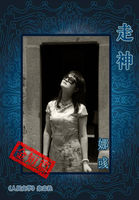In the hotel service there was one of those men who are porters in this world, but will be angels in the next, unless the perfect goodness of their looks, the constant kindness of their acts, belies them. The Marches had known and loved the man in their brief stay, and he had been the fast friend of Burnamy from the moment they first saw each other at the station. He had tenderly taken possession of General Triscoe on his arrival, and had constituted himself the nurse and keeper of the irascible invalid, in the intervals of going to the trains, with a zeal that often relieved his daughter and Burnamy. The general in fact preferred him to either, and a tacit custom grew up by which when August knocked at his door, and offered himself in his few words of serviceable English, that one of them who happened to be sitting with the general gave way, and left him in charge. The retiring watcher was then apt to encounter the other watcher on the stairs, or in the reading-room, or in the tiny, white-pebbled door-yard at a little table in the shade of the wooden-tubbed evergreens. From the habit of doing this they one day suddenly formed the habit of going across the street to that gardened hollow before and below the Grand-Ducal Museum. There was here a bench in the shelter of some late-flowering bush which the few other frequenters of the place soon recognized as belonging to the young strangers, so that they would silently rise and leave it to them when they saw them coming. Apparently they yielded not only to their right, but to a certain authority which resides in lovers, and which all other men, and especially all other women, like to acknowledge and respect.
In the absence of any civic documents bearing upon the affair it is difficult to establish the fact that this was the character in which Agatha and Burnamy were commonly regarded by the inhabitants of Weimar.
But whatever their own notion of their relation was, if it was not that of a Brant and a Brautigam, the people of Weimar would have been puzzled to say what it was. It was known that the gracious young lady's father, who would naturally have accompanied them, was sick, and in the fact that they were Americans much extenuation was found for whatever was phenomenal in their unencumbered enjoyment of each other's society.
If their free American association was indistinguishably like the peasant informality which General Triscoe despised in the relations of Kenby and Mrs. Adding, it is to be said in his excuse that he could not be fully cognizant of it, in the circumstances, and so could do nothing to prevent it. His pessimism extended to his health; from the first he believed himself worse than the doctor thought him, and he would have had some other physician if he had not found consolation in their difference of opinion and the consequent contempt which he was enabled to cherish for the doctor in view of the man's complete ignorance of the case. In proof of his own better understanding of it, he remained in bed some time after the doctor said he might get up.
Nearly ten days had passed before he left his room, and it was not till then that he clearly saw how far affairs had gone with his daughter and Burnamy, though even then his observance seemed to have anticipated theirs. He found them in a quiet acceptance of the fortune which had brought them together, so contented that they appeared to ask nothing more of it. The divine patience and confidence of their youth might sometimes have had almost the effect of indifference to a witness who had seen its evolution from the moods of the first few days of their reunion in Weimar. To General Triscoe, however, it looked like an understanding which had been made without reference to his wishes, and had not been directly brought to his knowledge.
"Agatha," he said, after due note of a gay contest between her and Burnamy over the pleasure and privilege of ordering his supper sent to his room when he had gone back to it from his first afternoon in the open air, "how long is that young man going to stay in Weimar?"
"Why, I don't know!" she answered, startled from her work of beating the sofa pillows into shape, and pausing with one of them in her hand.
"I never asked him." She looked down candidly into his face where he sat in an easy-chair waiting for her arrangement of the sofa. "What makes you ask?"
He answered with another question. "Does he know that we had thought of staying here?"
"Why, we've always talked of that, haven't we? Yes, he knows it. Didn't you want him to know it, papa? You ought to have begun on the ship, then. Of course I've asked him what sort of place it was. I'm sorry if you didn't want me to."
"Have I said that? It's perfectly easy to push on to Paris. Unless--"
"Unless what?" Agatha dropped the pillow, and listened respectfully. But in spite of her filial attitude she could not keep her youth and strength and courage from quelling the forces of the elderly man.
He said querulously, "I don't see why you take that tone with me. You certainly know what I mean. But if you don't care to deal openly with me, I won't ask you." He dropped his eyes from her face, and at the same time a deep blush began to tinge it, growing up from her neck to her forehead. "You must know--you're not a child," he continued, still with averted eyes, "that this sort of thing can't go on... It must be something else, or it mustn't be anything at all. I don't ask you for your confidence, and you know that I've never sought to control you."
This was not the least true, but Agatha answered, either absently or provisionally, "No."
"And I don't seek to do so now. If you have nothing that you wish to tell me--"
He waited, and after what seemed a long time, she asked as if she had not heard him, "Will you lie down a little before your supper, papa?"
"I will lie down when I feel like it," he answered. "Send August with the supper; he can look after me."
His resentful tone, even more than his words, dismissed her, but she left him without apparent grievance, saying quietly, "I will send August."













